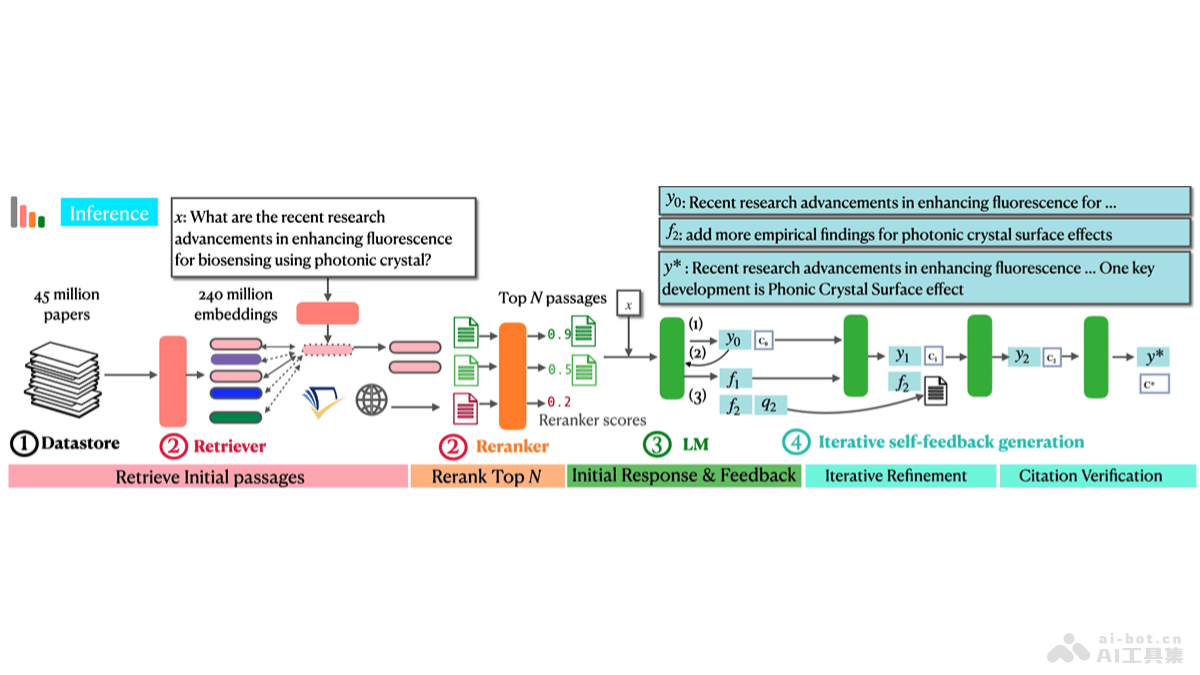OpenScholar
by University of Washington and Allen Institute for AIOpenScholar is a retrieval-augmented language model designed to help scientists answer questions by retrieving and synthesizing relevant scientific literature.
What is OpenScholar?
OpenScholar is a retrieval-augmented language model (LM) developed by the University of Washington and Allen AI Institute. It helps scientists answer questions by retrieving and synthesizing relevant scientific literature. The system uses a large-scale scientific paper database, custom retrievers and re-rankers, and an optimized 8B parameter language model to generate accurate, literature-based answers. OpenScholar surpasses existing proprietary and open-source models in providing factual answers and accurate citations, with OpenScholar-8B achieving 5% higher correctness than GPT-4o and 7% higher than PaperQA2 on the ScholarQABench. All related code and data are open-source, supporting and accelerating scientific research.
Main Features of OpenScholar
- Literature Retrieval and Synthesis: Retrieves a vast amount of scientific literature and synthesizes relevant information to answer user queries.
- Citation-Based Answers: Generates answers with accurate citations, enhancing reliability and transparency.
- Cross-Disciplinary Application: Applicable across various scientific fields, including computer science, biomedicine, physics, and neuroscience.
- Improved Retrieval Efficiency: Utilizes specialized retrievers and re-rankers to enhance the efficiency and accuracy of retrieving relevant scientific literature.
- Self-Feedback Iteration: Iteratively improves answers using a self-feedback mechanism, enhancing answer quality and citation completeness.
Technical Principles of OpenScholar
- Data Storage (OpenScholar Datastore): Contains over 45 million scientific papers and their corresponding 237 million paragraph embeddings, providing the foundational data for retrieval.
- Specialized Retrievers and Re-rankers: Retrievers and re-rankers trained on scientific literature datastores to identify and rank relevant literature passages.
- 8B Parameter Language Model: An 8B parameter large language model optimized for scientific literature synthesis tasks, balancing performance and computational efficiency.
- Self-Feedback Generation: Iteratively refines model outputs based on natural language feedback during inference, potentially involving additional literature retrieval to improve answer quality and fill citation gaps.
- Iterative Retrieval Augmentation: After generating an initial answer, the model produces feedback to guide further retrieval, iteratively improving the answer until all feedback is addressed.
Project Links for OpenScholar
- Project Website: allenai.org/blog/openscholar
- GitHub Repository: https://github.com/AkariAsai/OpenScholar
- HuggingFace Model Library: https://huggingface.co/collections/OpenScholar/openscholar-v1-67376a89f6a80f448da411a6
- arXiv Technical Paper: https://arxiv.org/pdf/2411.14199
Application Scenarios of OpenScholar
- Research Assistance: Helps researchers quickly access the latest research findings, keeping them updated in their field.
- Literature Review: Assists authors in integrating and summarizing a large volume of literature when writing academic papers or reports, improving writing efficiency.
- Interdisciplinary Research: As OpenScholar covers multiple scientific fields, it helps researchers explore connections and intersections between different disciplines.
- Education and Learning: Aids students and teachers in learning and teaching by providing in-depth literature analysis and summaries.
- Technology Monitoring: Enables R&D departments in companies to monitor technological trends, especially in fast-evolving fields.
Features & Capabilities
What You Can Do
Literature Retrieval
Literature Synthesis
Citation-Based Answers
Cross-Disciplinary Research
Education And Learning
Categories
Academic Search
Language Model
Scientific Literature
Open Source
Research Assistance
Literature Review
Interdisciplinary Research
Education
Technology Monitoring
Example Uses
- Research Assistance
- Literature Review
- Interdisciplinary Research
- Education and Learning
- Technology Monitoring
Getting Started
Pricing
free
Screenshots & Images
Primary Screenshot

Additional Images
Stats
95
Views
0
Favorites

